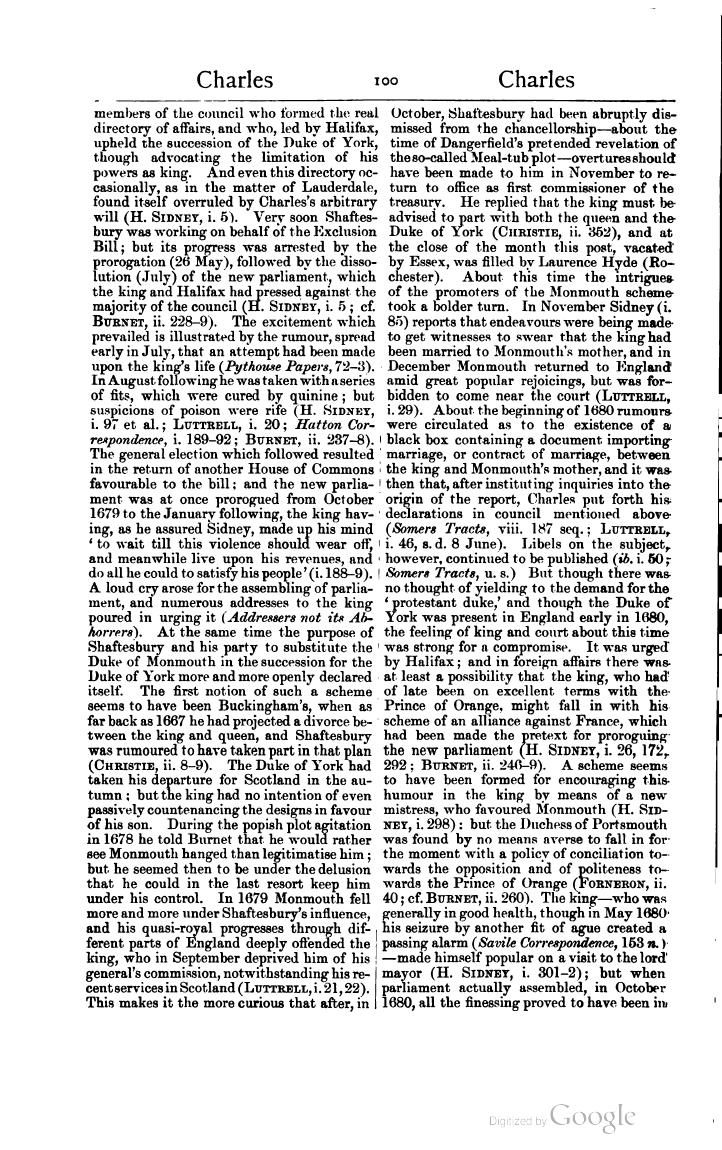members of the council who formed the real directory of affairs, and who, led by Halifax, upheld the succession of the Duke of York, though advocating the limitation of his powers as king. And even this directory occasionally, as in the matter of Lauderdale, found itself overruled by Charles's arbitrary will (H. Sidney, i. 5). Very soon Shaftesbury was working on behalf of the Exclusion Bill; but its progres was arrested by the prorogation (26 May), followed by the dissolution (July) of the new parliament, which the king and Halifax had pressed against the majority of the council (H. Sidney, i. 5; cf. Burnet, ii. 228–9). The excitement which prevailed is illustrated by the rumour, spread early in July, that an attempt had been made upon the king's life (Pythouse Papers, 72–3). In August following he was taken with a series of fits, which were cured by quinine; but suspicions of poison were rife (H. Sunset, i. 97 et al.; Luttrell, i. 20; Hatton Correspondence, i. 189–92; Burnet, ii. 237–8). The general election which followed resulted in the return of another House of Commons favourable to the bill; and the new parliament was at once prorogued from October 1679 to the January following, the king having, as he assured Sidney, made up his mind ‘to wait till this violence should wear off, and meanwhile live upon his revenues, and do all he could to satisfy his people' (i. 188–9). A loud cry arose for the assembling of parliament, and numerous addresses to the king poured in urging it (Addressers not its Abhorrers). At the same time the purpose of Shaftesbury and his party to substitute the Duke of Monmouth in the succession for the Duke of York more and more openly declared itself. The first notion of such a scheme seems to have been Buckingham's, when as far back as 1667 he had projected a divorce between the king and queen, and Shaftesbury was rumoured to have taken part in that plan (Christie, ii. 8–9). The Duke of York had taken his departure for Scotland in the autumn; but the king had no intention of even passively countenancing the designs in favour of his son. During the popish plot agitation in 1678 he told Burnet that he would rather see Monmouth hanged than legitimate him; but he seemed then to be under the delusion that he could in the last resort keep him under his control. In 1679 Monmouth fell more and more under Shaftesbury's influence, and his quasi-royal progresses through different parts of England deeply offended the king, who in September deprived him of his general's commission, notwithstanding his recent services in Scotland (Luttrell, i. 21, 22). This makes it the more curious that after, in October, Shaftesbury had been abruptly dismissed from the chancellorship—about at the time of Dangerfield's pretended revelation of the so-called Meal-tub plot—overtures should have been made to him in November to return to other as first commissioner of the treasury. He replied that the king must be advised to part with both the queen and the Duke of York (Christie, ii. 352), and at the close of the month this post, vacated by Essex, was filled by Laurence Hyde (Rochester). About this time the intrigues of the promoters of the Monmouth scheme took a bolder turn. In November Sidney, (i. 85) reports that endeavours were being made to get witnesses to swear that the king had been married to Monmouth's mother, and in December Monmouth returned to England amid great popular rejoicings, but was forbidden to come near the court (Luttrell, i. 29). About the beginning of 1680 rumours were circulated as to the existence of a black box containing a document importing marriage, or contract of marriage, between the king and Monmouth's mother, and it was then that, after instituting inquiries into the origin of the report, Charles put forth his declarations in council mentioned above (Somers Tracts, viii. 187 seq.; Luttrell, i. 48, s. d. 8 June). Libels on the subject, however, continued to he published (ib. i. 50; Somers Tracts, u. s.) But though there was no thought of yielding to the demand for the 'protestant duke,’ and though the Duke of York was present in England early in 1680, the feeling of king and court about this time was strong for a compromise. It was urged by Halifax; and in foreign affairs there was at least a possibility that the king, who had of late been on excellent terms with the Prince of Orange, might fall in with his scheme of an alliance against France, which had been made the pretext for proroguing the new parliament (H. Sidney, i. 26, 172, 292; Burnet, ii. 246–9). A scheme seems to have been formed for encouraging this humour in the king by means of a new mistress, who favoured Monmouth (H. Sidney, i. 298): but the Duchess of Portsmouth was found by no means averse to fall in for the moment with a policy of conciliation towards the opposition and of politeness towards the Prince of Orange (Forneron, ii. 40; cf. Burnet, ii. 260). The king—who was generally in good health, though in May 1680 his seizure by another fit of ague created a passing alarm (Savile Correspondence, 153 n.)— made himself popular on a visit to the lord mayor (H. Sidney, i. 301–2); but when parliament actually assembled, in October 1680, all the finessing proved to have been in
